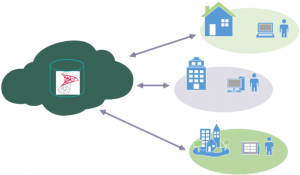What is SQL Server?
This is part of a series of articles explaining in Layman’s terms some of the more technical aspects of computing as they might apply to small businesses looking to invest in software for their business or the infrastructure to run it on. This article will also look to explain “What is a SQL Server” in relation to cloud computing for small businesses.
When we’re talking about what is an SQL Server in this article we’re going to focus on Microsoft’s SQL Server product simply because it is the most common for small and medium businesses and it is more than likely that applications developed for these businesses will be using Microsoft’s SQL Server.
So, what is SQL Server?
SQL Server is a software application designed to manage databases, it stores and retrieves data as requested by other applications. When software developers are writing new business applications that store information in a database they will very often use SQL Server’s functionality to look after the databases rather than reinventing the wheel writing their own code to do the same thing. This makes writing database applications easier and quicker (and therefore cheaper) as well as making them more reliable, scalable and secure.
applications. When software developers are writing new business applications that store information in a database they will very often use SQL Server’s functionality to look after the databases rather than reinventing the wheel writing their own code to do the same thing. This makes writing database applications easier and quicker (and therefore cheaper) as well as making them more reliable, scalable and secure.
SQL Server is known as a “Relational Database” Management System. Data is stored in tables in a similar way to rows and columns in a spreadsheet. If you imagine a database containing accounting information you may have a table for each invoice with values, VAT, Totals, invoice number etc. Each invoice relates to a customer but instead of recording the customer’s details (name, address, discounts etc.) with each invoice you just record it once in a separate table called Customers. The Customers table and Invoices table are linked or “related”.
The “Management System” part of SQL Server makes sure the databases are stored efficiently and the data can be searched or retrieved as quickly as possible. It also makes sure multiple people connecting to the same data are managed properly so you don’t get problems if two people change the same information at the same time.
What is SQL Server – SQL Server Editions
There are various flavours of SQL Server depending on how big the databases are and what they need to be use for.
- Enterprise – For large organisations with complex requirements Enterprise Edition can manage databases up to 524PB (Petabytes – 1000 terabytes) and the amount of memory and CPU cores is only limited by the operating system it is running on.
- Standard – This is the edition you are most likely going to need if you have a reasonable size database, 10GB or more, or have lots of people connecting to it. It has a limit of 128GB Memory but can also manage databases up to 524PB
- Web – designed as a more cost effective way of managing databases for web sites
- Business Intelligence – similar to SQL Standard but with more business intelligence analytical tools
- Workgroup – This was only available up to SQL 2008 which is now end of life. Designed for small business applications.
- Express – SQL Express is very common for small and medium businesses. While it only supports databases up to 10GB and can only use 1GB memory and 1 CPU core, it is a free licence from Microsoft so lots of applications aimed at small and medium businesses will take advantage of SQL Express. It is a very cost effective way of providing a robust and reliable database engine for small businesses
There are a few other specialised version of SQL such as Evaluation and Developer Editions that may also be of interest.
What is SQL Server – Cloud Computing
As a small business looking at business applications the requirement for SQL Server Standard can sometimes appear cost prohibitive. SQL licencing is fairly complicated and it certainly isn’t cheap. The cheapest licencing model costs over £650 per server and then £150 per user/device for Client Access Licences (CALs). For lots (or an unknown number) of users you can licence per CPU core, with a minimum of 2 cores which will set you back at least £2,600. This is before any hardware you may need to purchase to run SQL Server. With the licences, hardware and setup you would want to budget a minimum of around £4k-£5k.
SQL Server is one system where cloud computing can really offer some very tangible financial benefits to small businesses. As cloud hosting is on a pay as you go basis it is a much more palatable way of paying for SQL licences. See our page on SQL Server hosting for more information on this.
Running your business applications on a Hosted Desktop/Hosted Application platform using SQL Express (which is the free version) is probably one of the most cost effective ways of running a SQL Server based application as there is no outlay for hardware or SQL Server licences.
Contact us about SQL Server
Why not take a look at our SQL Server Hosting page to find out more about the service we offer. You can also contact us for a no obligation chat and quote by filling out our online contact form or calling us on 01282 500 318
Why Not Get A Free Trial Demo?
Contact us here for a fast response
Call Us
+44 (0)1282 500318
Office
Your Office Anywhere, 4 Dominion Court, Billington Road, Burnley, BB11 5UB
Hours (Sales)
M-F: 9am - 5pm
S-S: Closed

